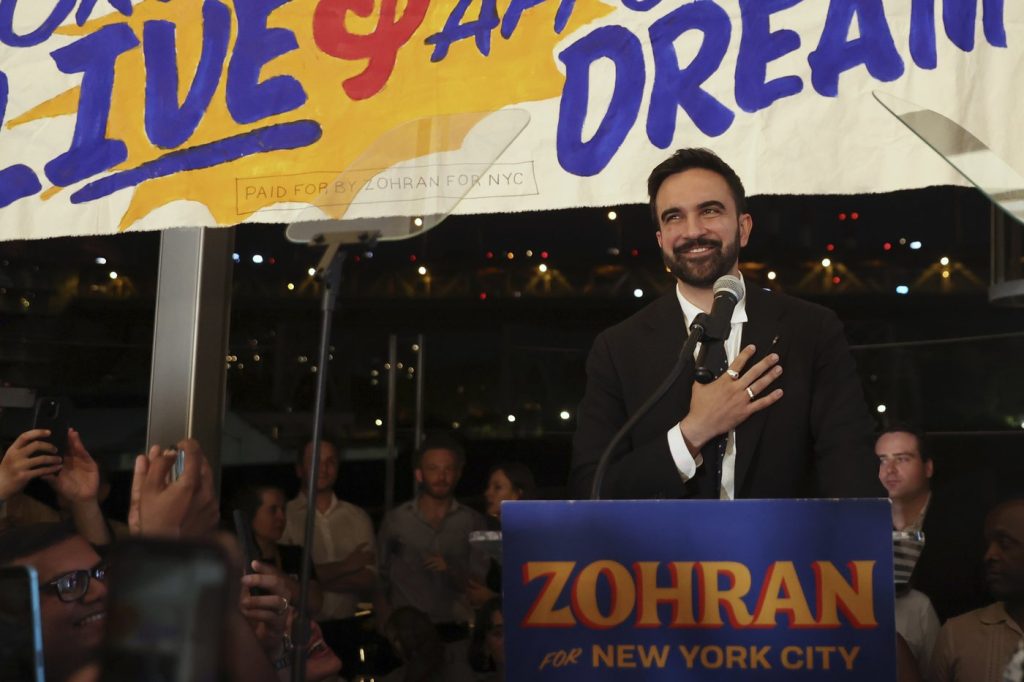NEW YORK (AP) In a surprising turn of events, Zohran Mamdani emerged victorious in New York City's Democratic mayoral primary on Tuesday night, after Andrew Cuomo conceded the race. Mamdani, a 33-year-old democratic socialist and previously an unknown candidate, built a substantial lead over the seasoned yet embroiled former governor, Cuomo, who had faced numerous scandals during his tenure.
While the final outcome of the race is still pending a ranked choice count, Mamdani quickly established a commanding position just hours after polls closed, placing him far ahead of Cuomo. In a triumph that echoed across the city, Mamdani proclaimed to his supporters, "I will be your Democratic nominee for the mayor of New York City," emphasizing his commitment to represent all New Yorkers, regardless of their voting preference.
Cuomo, 67, who was positioned as the front-runner throughout the race, conceded defeat and acknowledged Mamdani, stating, "Tonight is his night. He deserved it. He won." Despite being a prominent figure in New York politics, Cuomo lagged behind Mamdani in first-choice votes, facing a steep challenge in the ranked choice voting system.
If ultimately elected, Mamdani would make history as the first Muslim and Indian American mayor of New York City. His candidacy has drawn significant attention, especially after incumbent Mayor Eric Adams chose to skip the primary and is now campaigning as an independent in the upcoming general election. Cuomo is also contemplating running in the general election.
Unofficial results from the New York City Board of Elections indicated that Mamdani appeared on more ranked ballots than Cuomo and was favored as a second choice by tens of thousands of voters. This dynamic suggests that the number of votes accounted for in ranked choice voting may narrow, potentially allowing Mamdani to surpass the 50% threshold needed for victory.
This mayoral primary reflects the ideological split within the Democratic Party, coming just four years after Cuomo's resignation following allegations of sexual harassment. Mamdani's campaign resonated deeply with voters, primarily focusing on the city's high cost of living. He garnered endorsements from prominent progressives such as Rep. Alexandria Ocasio-Cortez and Sen. Bernie Sanders, gaining swift momentum in a race that initially saw him as an underdog.
On the other hand, Cuomo's campaign was marked by his experience and established political network, portraying New York City as a chaotic environment in need of strong leadership. However, criticisms arose towards Mamdani, with some questioning his administrative capabilities and challenging his support for Palestinian human rights.
Mamdani's robust and energetic campaign was characterized by an extensive grassroots effort involving young canvassers, with eye-catching posters and social media presence that highlighted his vision for the city — including proposals for free public transportation, childcare, affordable housing, a higher minimum wage, all funded by taxes on wealthy individuals.
Supporters celebrated Mamdani's apparent triumph, with fervor visible in the streets of Central Brooklyn, where the atmosphere was described as euphoric. Amani Kojo, a 23-year-old first-time voter, expressed her excitement, noting the vibrancy and energy of the campaign, underlining that New York City felt "alive again."
In contrast, the political landscape has shifted in response to late-breaking issues involving Mayor Adams, providing a possible route for Cuomo's return to prominence. However, the ramifications of the recent primary and the ideological divisions it highlighted could signal the trajectory the Democratic Party may take in future elections. As the race moves forward, the implications of this primary are poised to shape the political conversation leading into the upcoming general election.











